Home Theater System
Model: RC-MICRO-5-1
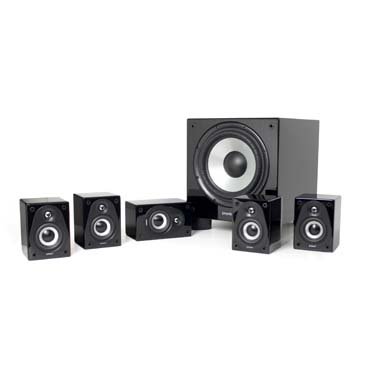
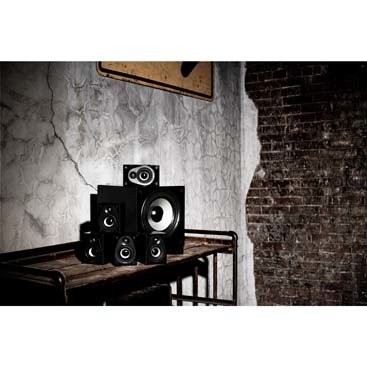
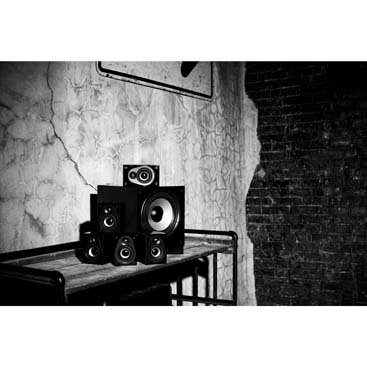
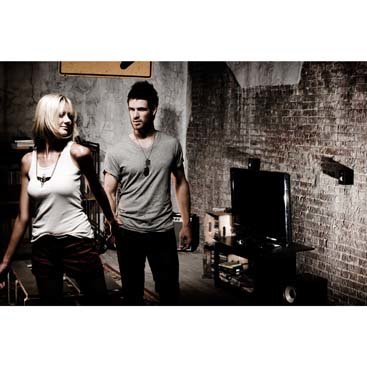
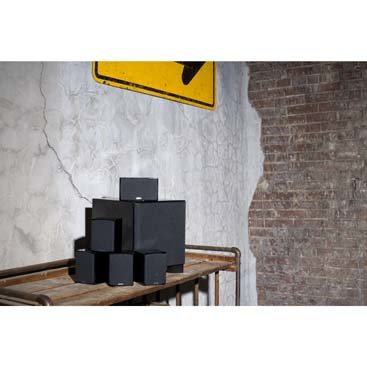
KEY FEATURES
Packaged 5.1 home theater system
Micro-sized speakers and subwoofer look great with contemporary flat panels
High-gloss black finish has high-tech look
Amazing deep bass from 240-watt subwoofer
Ribbed Elliptical Surround woofers create high efficiency, low distortion
An aluminum dome tweeter for sonic accuracy
Magnetic shielding to eliminate interference with CRTs
PRODUCT OVERVIEW
Currently this product is available in the US only
RC-Micro is our most compact collection of high-tech components satellites, subwoofer and center channel. Though small, this system packs a big wallop inside their great looking high-
Features
Packaged 5.1 home theater system
Micro-sized speakers and subwoofer look great with contemporary flat panels
High-gloss black finish has high-tech look
Amazing deep bass from 240-watt subwoofer
Ribbed Elliptical Surround woofers create high efficiency, low distortion
An aluminum dome tweeter for sonic accuracy
Magnetic shielding to eliminate interference with CRTs
The Lowdown
RC-Micro proves beyond doubt that small can still be powerful. And, it shatters any illusions about packaged home theater systems; you won't get better performance, or better looks, even if you buy individual pieces.
This system delivers lifelike performance from your favorite games and movies, with their screaming aluminum cone tweeters to the massive bottom end provided by the woofers and the sub, which features a Ribbed Elliptical surround for great bass extension. Keyhole slots and threaded inserts let you choose how and where to place your speakers.
This system delivers lifelike performance from your favorite games and movies, with their screaming aluminum cone tweeters to the massive bottom end provided by the woofers and the sub, which features a Ribbed Elliptical surround for great bass extension. Keyhole slots and threaded inserts let you choose how and where to place your speakers.
Bragging Rights
The RC Micro 5.1 components were developed with Energy's audio principles in mind:
Flat On-Axis Frequency Response with Wide Bandwidth: Speakers should reproduce the entire audio range in a uniform manner. By ensuring that no one frequency dominates any other, Energy ensures that every note is the way it was intended to be and the sound as natural as possible.
Wide and Constant Dispersion: Sound at all frequencies radiating from the speaker should be in an even pattern, in all directions throughout the room.
Low Distortion and Resonance: No speaker system is distortion- or resonance-free, but Energy has achieved a significantly lower distortion level, a clearly audible improvement.
The RC Micro 5.1 home theater system offers terrific performance and great features:
The RC-Micro 5.1 home theater speaker system offers amazing performance in an amazingly small package. It includes a powerful 240-watt subwoofer with a down-firing port, 8-inch driver and Ribbed Elliptical surround for bass that you feel as much as hear. The .50-inch hyperbolic aluminum dome tweeter on the satellites and center channel focuses sound for clearer dialogue and stirring music. Gold plated push connectors ensure positive connection for top-flight performance.
Flat On-Axis Frequency Response with Wide Bandwidth: Speakers should reproduce the entire audio range in a uniform manner. By ensuring that no one frequency dominates any other, Energy ensures that every note is the way it was intended to be and the sound as natural as possible.
Wide and Constant Dispersion: Sound at all frequencies radiating from the speaker should be in an even pattern, in all directions throughout the room.
Low Distortion and Resonance: No speaker system is distortion- or resonance-free, but Energy has achieved a significantly lower distortion level, a clearly audible improvement.
The RC Micro 5.1 home theater system offers terrific performance and great features:
The RC-Micro 5.1 home theater speaker system offers amazing performance in an amazingly small package. It includes a powerful 240-watt subwoofer with a down-firing port, 8-inch driver and Ribbed Elliptical surround for bass that you feel as much as hear. The .50-inch hyperbolic aluminum dome tweeter on the satellites and center channel focuses sound for clearer dialogue and stirring music. Gold plated push connectors ensure positive connection for top-flight performance.
Maximum Performance Tips
The center channel speaker needs to be centrally located so that the dialogue appears to be coming from the center of the screen. It needs to be above or below the monitor, as closely to it as possible. If you're using a rear projection television, the most likely option is to place it above the screen. If you have a front projection system, you have choices - stand mounting, or placement on furniture, for example. It is important, though, to place the speaker so that its front edge is even with the edge of the shelf or stand supporting it. Unwanted diffraction occurs when the center channel is too far back into a cabinet or other surface with edges that could impede sound dispersion.
For left or right front channels, the distance between the speakers should be 6-8 feet at minimum for the best stereo imaging. The optimum room shape is rectangular, with the speakers along one of the shorter walls, facing the opposite side. If possible, do not place speakers against a wall or at rear of a bookshelf; corner placement is usually the worst option. Try to keep the speakers - especially rear vented models - at least two feet from the surface behind it, unless you use a vent plug. For best results mounting on a rear wall, position the speakers so they flank the main listening area and point toward the front of the room. They should be raised to a height of approximately six feet and should ideally have a space of six feet between them.
The three most common subwoofer locations include corners (which can result in boomy or exaggerated low frequency response), placement along a wall, away from the corner (producing moderate bass performance with increased fidelity over corner placement), or beside a front speaker (creating a better blend with the front speaker, but sacrificing overall volume). Experimentation with subwoofer placement is highly encouraged; slight adjustments can create big differences in sound reproduction. To test subwoofer placement, install it temporarily in your main listening position and walk around the listening room while playing a familiar piece of music until you find the best sounding position.
For left or right front channels, the distance between the speakers should be 6-8 feet at minimum for the best stereo imaging. The optimum room shape is rectangular, with the speakers along one of the shorter walls, facing the opposite side. If possible, do not place speakers against a wall or at rear of a bookshelf; corner placement is usually the worst option. Try to keep the speakers - especially rear vented models - at least two feet from the surface behind it, unless you use a vent plug. For best results mounting on a rear wall, position the speakers so they flank the main listening area and point toward the front of the room. They should be raised to a height of approximately six feet and should ideally have a space of six feet between them.
The three most common subwoofer locations include corners (which can result in boomy or exaggerated low frequency response), placement along a wall, away from the corner (producing moderate bass performance with increased fidelity over corner placement), or beside a front speaker (creating a better blend with the front speaker, but sacrificing overall volume). Experimentation with subwoofer placement is highly encouraged; slight adjustments can create big differences in sound reproduction. To test subwoofer placement, install it temporarily in your main listening position and walk around the listening room while playing a familiar piece of music until you find the best sounding position.


